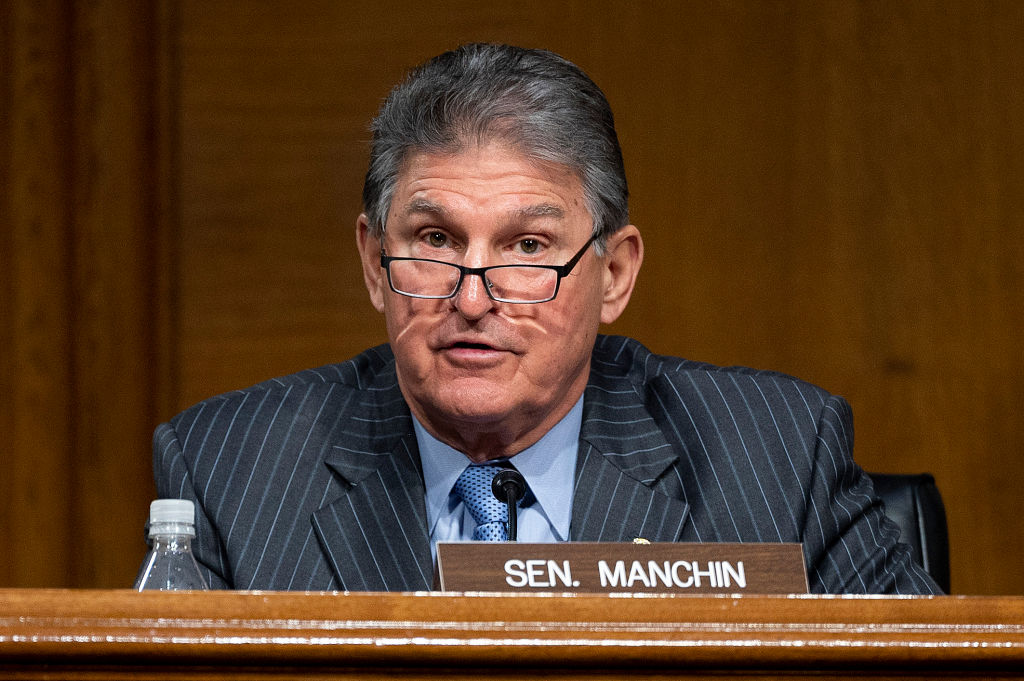What will the Inflation Reduction Act actually accomplish?
It's either a 'big effing deal' or the start of a new rise in drug prices


A free daily email with the biggest news stories of the day – and the best features from TheWeek.com
You are now subscribed
Your newsletter sign-up was successful
At long last, it's time to Build Back Better — though not by that name. Over the weekend, the Senate passed the Inflation Reduction Act, a climate and health-care bill that finally got the backing of Sens. Joe Manchin (D-W.Va.) and Kyrsten Sinema (D-Ariz.), the two holdout Democrats who had long blocked the party from passing a much more expensive and expansive bill.
Gone from the final package: Provisions for free pre-kindergarten, paid family leave, and expanded dental and vision care under Medicare. Sen. Bernie Sanders (I-Vt.) was predictably unhappy, though he still voted for the final bill, which he said "goes nowhere near far enough" to help working families but is still "a step forward."
The remaining bill is still a lot: $369 billion for climate change efforts, including consumer tax credits for electric cars and incentives for the domestic production of solar panels; $64 billion for health initiatives, including a long-sought-by-Democrats provision that lets Medicare negotiate drug prices with pharmaceutical companies; and $739 billion to hire new IRS auditors and impose a corporate minimum tax. Those last provisions should reduce the federal budget deficit — and, ostensibly, help bring down inflation. They also sparked hostility from Republicans and their allies.
The Week
Escape your echo chamber. Get the facts behind the news, plus analysis from multiple perspectives.

Sign up for The Week's Free Newsletters
From our morning news briefing to a weekly Good News Newsletter, get the best of The Week delivered directly to your inbox.
From our morning news briefing to a weekly Good News Newsletter, get the best of The Week delivered directly to your inbox.
Will the Inflation Reduction Act actually reduce inflation? And what else will it accomplish?
It will bring down inflation — but not right away
Most Americans "won't feel the impact immediately or particularly significantly" of the bill's inflation-reduction provisions Ellen Ioanes writes for Vox — so don't expect to see your grocery bill shrink right away. But the bill "represents some significant steps forward" on the health and climate fronts. It extends health insurance subsidies under the Affordable Care Act — money that was about to run out, "which would have meant increased premiums" for millions of Americans. One big problem: Though the IRA includes the "largest-ever investments in climate change mitigation efforts, clean energy production, and climate justice programs," and thus "provides a glimmer of hope" on those issues, it's still not enough. It will be years before those initiatives "pay off in the form of lower greenhouse gas emissions." Progressives can celebrate what the Inflation Reduction Act accomplishes, but they shouldn't lose sight of the bigger picture. "The bill provides far less than what's actually needed — a total system overhaul."
The 'Inflation Reduction Act' won't fix what ails the economy
The truth is that the IRA might not affect inflation one way or the other, Steve Pearlstein writes for The Washington Post. The Congressional Budget office estimated the bill will "change the inflation rate by less than one-tenth of 1 percent — but it isn't sure whether the change would be up or down." In fact, it's silly for people to think that Washington can turn "a couple of dials" to control employment and inflation. The real underlying problem is not that the U.S. government spent too much money keeping the economy running during the pandemic. Instead, it's that the country lived "well beyond its means" for years before COVID struck, thanks to giant trade and budget deficits enabled by an "overvalued dollar, artificially low interest rates, and the willingness of trading partners to recycle their surpluses back into the American economy." Until America gets down to the business of "bringing things back into balance," we're likely to "continue living with the boom-and-bust cycle of the past 30 years."
The bill puts Democrats 'on a promising new path'
The IRA is a "big effing deal," Michael Tomasky writes for The New Republic, because it turns away from 40 years of conservative dominance "by asserting that the government has a role in structuring markets, promoting growth, and guiding industrial policy." Movements like Occupy Wall Street, the Fight for $15 minimum wage campaign, and the Bernie Sanders presidential campaigns created a new generation of activists and economists that "has started to question the models and assumptions of their free-market elders." So while the bill should be bigger — and Republicans should be ashamed of stripping out a provision to cap the cost of insulin for diabetes patients — its efforts make clear that the federal government should not just encourage economic growth, but also should take the lead "in determining what kind of growth we want." The days of Reagan Era laissez-faire economics are over: "Society is not just the sum of 330 million individuals pursuing their self-interest. Someone has to steer the ship."
A free daily email with the biggest news stories of the day – and the best features from TheWeek.com
Americans will pay the price for capping drug costs
Don't be fooled by the IRA's provision giving Medicare the power to negotiate drug prices, The Wall Street Journal says in an editorial. The bill will "raise drug costs and health premiums for 220 million privately insured Americans." Why? Because "if drug makers must give Medicare steep discounts on certain drugs, they will compensate by increasing prices in the commercial market." It's already the case that Medicare costs on patient care force "hospitals and physicians [to] charge private insurance plans more" than they would otherwise. The result is that "private insurers on average pay about twice as much as Medicare" for hospital services. Now the same dynamic will apply to pharmaceutical prices. And that raises a question: "How is this supposed to reduce inflation?"
Joel Mathis is a writer with 30 years of newspaper and online journalism experience. His work also regularly appears in National Geographic and The Kansas City Star. His awards include best online commentary at the Online News Association and (twice) at the City and Regional Magazine Association.
-
 The Olympic timekeepers keeping the Games on track
The Olympic timekeepers keeping the Games on trackUnder the Radar Swiss watchmaking giant Omega has been at the finish line of every Olympic Games for nearly 100 years
-
 Will increasing tensions with Iran boil over into war?
Will increasing tensions with Iran boil over into war?Today’s Big Question President Donald Trump has recently been threatening the country
-
 Corruption: The spy sheikh and the president
Corruption: The spy sheikh and the presidentFeature Trump is at the center of another scandal
-
 Republicans are threatening to tank Manchin's pro-oil bill over 'bad blood' from climate deal
Republicans are threatening to tank Manchin's pro-oil bill over 'bad blood' from climate dealSpeed Read
-
 Goldman Sachs cuts U.S. growth forecast on Joe Manchin's Build Back Better opposition
Goldman Sachs cuts U.S. growth forecast on Joe Manchin's Build Back Better oppositionSpeed Read
-
 Manchin will support Democrats' reconciliation bill, allowing COVID relief to move forward without GOP
Manchin will support Democrats' reconciliation bill, allowing COVID relief to move forward without GOPSpeed Read
